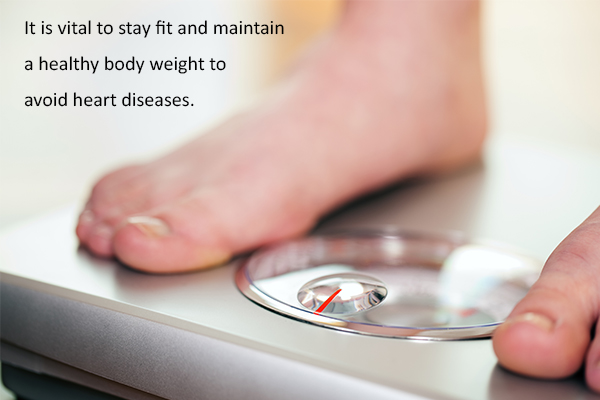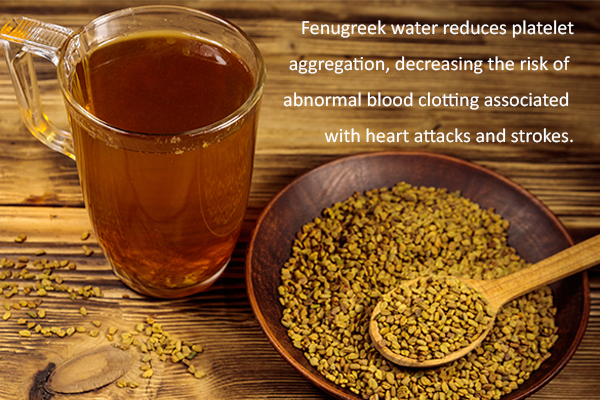In this article:
The heart works throughout your life without a pause, beating and pumping blood to each and every body part. It maintains a well-constructed flow of oxygen, nutrients, and hormones to each and every cell of the body.

It also acts as a channel to drive away from the waste products generated as a result of various biochemical reactions necessary for the sound functioning of the body.
The heart works efficaciously until there are obstructions that impede its functioning, which will reflect on your health. This is manifested in the form of various heart diseases.
Heart disease refers to a variety of structural and functional problems that affect the heart. It is most often related to atherosclerosis, or plaque buildup in arterial walls, which results in the narrowing of the arteries, thereby inhibiting blood flow and increasing the risk for a heart attack or stroke.
Cardiovascular diseases along with stroke and heart ailments are the most prevalent health problems all across the globe. Heart diseases are the leading cause of mortality in the United States, with stroke being the fifth cause. (1)
How to Manage Heart Diseases at Home
There are several effective remedies to prevent and manage heart diseases. Prior to initiating these home remedies, it is necessary to seek the advice of a medical professional.
Many naturally occurring substances can produce negative outcomes when taken with prescription medications. It is necessary to have appropriate monitoring and follow-up to manage heart disease.
You can incorporate home remedies and healthy lifestyle changes to keep tabs on the risk factors and keep your heart healthy.
Lifestyle changes
Incorporating the following lifestyle changes can help prevent heart disease and promote heart health.
1. Regular exercise

Regular exercise paired with a healthy diet can help prevent and manage heart disease. Walking, jogging, bicycling, jumping rope, aerobics, and cardio exercises are particularly beneficial for strengthening your heart, improving circulation, and lowering blood pressure.
Exercising helps maintain healthy body weight and reduces stress. In addition to physical exercise, perform deep-breathing exercises to help you feel more relaxed and rested.
The American Heart Association suggests exercising 30 minutes per day for 5 days a week to improve your heart health and reduce your risk of heart disease. Consult your doctor when determining the most appropriate exercise regimen for you. (2)
2. Follow a healthy diet
You are what you eat. As cliché as it may sound, it remains true for all health conditions. A healthy wholesome diet can help keep your weight, blood pressure, and cholesterol levels normal, besides keeping away inflammation. All these parameters are essential to ward off heart diseases. (3)
Listed below are the changes in your diet that must be implemented to say a big no to heart diseases: (4)
- Enrich your diet with fruits, vegetables, healthy omega-3 nuts, fatty fish, and whole grains.
- Restrict or limit alcohol intake.
- Consume refined carbs and red and processed meat in moderation.
- Limit the consumption of sugar and sodium.
- Avoid eating foods with trans fat.
3. Manage your stress levels

Stress induces the production of the stress hormone cortisol. Uncontrollable stress can lead to an overflow of stress hormones that can disrupt the inflammatory responses. (5)(6) Such disruption can lead to structural changes that can hinder the functioning of the heart.
- It is essential to manage stress through meditation, talk therapy, deep breathing, or other strategies that can help calm your mind and body.
- Take a casual break from long work periods to bust your stress.
- Indulge in a daily activity such as exercise, yoga, or journal writing to reduce stress.
4. Quit smoking
Smoking can cause heart diseases such as atherosclerosis and heart attack. The smoke of tobacco contains chemicals that have harmful effects on your heart and blood vessels.
Cigarette smoke contains carbon monoxide that, upon entering the blood, competes with oxygen for transport. This substitution of gases brings an increase in the levels of blood pressure and heart rate, putting a strain on the heart to supply the body with adequate oxygen. (7)
By leaving smoking you can fight the risk of heart disease similar to that of a nonsmoker in 5 years’ time. (8)
Make efforts to quit the habit. If possible, seek the help of a deaddiction center or a doctor.
5. Maintain a healthy weight

It is vital to stay and maintain a healthy body weight to avoid heart diseases. (9) Several studies have linked obesity to an increased incidence of death from cardiovascular diseases. (10)
Aim to maintain your weight according to your body mass index (BMI).
6. Get enough sleep
Getting the right amount of sleep can help you ward off stress. Stress can be a factor when it comes to heart diseases by causing inflammation and narrowing of the arterial walls.
A study published in the Journal of the American Medical Association found that every extra hour of sleep decreased the risk of developing coronary artery calcification by 33%. (11)
Although adults require 7–8 hours of sleep every day to promote their health, it may vary from person to person. This time period is more for children and teenagers.
Deviating from the normal 7–8 hours of sleep is related to a likelihood of cardiovascular diseases and mortality in the long run. (12)
7. Control your blood pressure

Monitoring your blood pressure can give you an insight into your heart health.
Get a blood pressure measurement once a year. In case you have a blood pressure problem or a family history of cardiovascular diseases, get it checked more often. (13)
Normal blood pressure values are less than 120 mmHg for systolic pressure and less than 80 mmHg for diastolic pressure. (14)
Dietary additions to encourage heart health
The following dietary interventions can help promote and preserve your heart health.
1. Take nutritional supplements
Your body relies on nutrition to maintain your health. Several studies suggest that with progression in age, the levels of several essential nutrients that are accountable for protecting you against diseases get diminished.
In order to replenish their levels and regulate your cardiovascular health, it is best to keep your nutrient levels at an optimum.
You can do this by taking doctor-approved supplements of fish oil to derive DHA and EPA, coenzyme Q10, (15) antioxidants, magnesium, (16) B-complex vitamins, and other minerals. (17)
2. Relish dark chocolate

Dark chocolates contain abundant antioxidants that can help maintain the elasticity of the blood vessels. This can keep away many cardiovascular diseases at bay. (18)
You can prevent cardiovascular diseases by consuming less than 6 servings per week of dark chocolate (containing 70% cocoa). (19)
3. Chew a garlic clove daily
Several studies have found garlic to be beneficial for conditions such as high blood pressure, high cholesterol levels, and coronary heart disease.
The chemical compounds found in garlic help to slow the development of atherosclerosis, or the hardening of the arteries. Garlic helps to improve circulation throughout the body. It can also inhibit clotting in the body. (20)
- Eat one or two freshly crushed garlic cloves daily. If you find the taste too strong, drink a glass of milk after eating the garlic.
- Alternatively, you can take garlic supplements. The general recommendation is 600 mg to 1,200 mg of garlic extract divided into three equal doses per day.
Note: Garlic may interfere with certain medications due to its blood-thinning properties. Consumption of excess garlic can lead to bleeding problems. Consult your doctor before taking this herb. Stop taking garlic and its supplements 7 days prior to operative intervention.
4. Drink green tea

Green tea contains powerful antioxidants that improve the health of cells that form the innermost lining of the heart and blood vessels. It helps reduce cholesterol and triglyceride levels. In addition, green tea helps to control blood sugar and boosts metabolism.
A study highlighted that drinking more than 5 cups of green tea per day was related to lowering the risk of death from a heart attack or stroke by 26%. (21)
- Drink 3–4 cups of green tea (preferably caffeine-free) daily.
- Alternatively, you can take 100 to 750 mg of standardized green tea extract per day.
Note: Consult your doctor if you are on medication or pregnant.
5. Consider hawthorn supplements
In western herbalism, hawthorn is a well-known herb used for the remedy of heart conditions. It helps to increase blood flow to the heart and improves cardiac muscle contractions, thus leading to a stronger pumping activity.
It helps increase cardiac performance and output by reducing the heart’s workload. It has an antiarrhythmic effect that helps regulate the heartbeat. (22)
You can take this herb in supplement form by way of an extract, standardized to contain 2% to 3% flavonoids. The general dosage is 300 mg to 600 mg three times daily. Follow this natural treatment for several weeks to a few months.
Note: Although this herb is safe to use, consult your doctor before taking this or any other herbal remedy.
6. Stir a mix of Arjuna bark powder and honey
Terminalia Arjuna is an important Ayurvedic herb used for heart conditions. It is considered a natural cardiotonic and is credited with cardiac restorative properties. The herb has the ability to strengthen the cardiac muscles, reduce arterial congestion, and lower blood pressure. (23)
A study by researchers at Kasturba Medical College in India found that this herb helped reduce angina attacks by 30%. Moreover, prolonged use of this herb was not related to any adverse effects. (23)
- Add a ½ teaspoon of Arjuna tree bark powder and a little honey to 1 glass of warm water. Drink this mixture three times daily for a few months.
- Alternatively, you can take this herb in supplement form in doses of 500 mg every 8 hours daily. Continue this natural treatment for 3 months.
7. Brew Chinese hibiscus tea

Chinese hibiscus (Hibiscus rosa-sinensis) has been reported to contain anthocyanins. Anthocyanins are phytochemicals that can have numerous benefits on the heart.
Research conducted on rats has shown that the compounds found in hibiscus helped to reduce oxidative stress in their heart tissue. (24)
- Boil 2 petals of a hibiscus flower in 1 cup of water.
- Strain the liquid and add 1 teaspoon of raw honey to it.
- Drink this hibiscus tea once daily for a few weeks.
8. Drink turmeric milk
Studies indicate that turmeric can help prevent atherosclerosis. Turmeric contains a bioactive ingredient called curcumin that helps maintain heart health by reducing cholesterol oxidation, plaque buildup, and clot formation.
It provides anti-inflammatory benefits and helps lower LDL. Being a powerful antioxidant, turmeric plays a role in fighting free radicals that contribute to aging and several chronic diseases. (25)
- Use turmeric regularly in your cooking.
- You can also boil 1 teaspoon of turmeric powder in 1 cup of water or milk. Drink this mixture once or twice daily for several weeks to a few months.
- Another option is to take this herb in supplement form. The general dosage is 400 mg to 600 mg of standardized curcumin powder supplement three times daily. Consult your doctor for the proper dosage for your case.
9. Try cayenne pepper
Cayenne pepper is beneficial for heart and circulatory problems. It contains a compound called capsaicin that helps reduce the risk of irregular heart rhythms and lower cholesterol levels. The phytochemicals present in this spice purify the blood and enhance immunity. (26)
- Add a ½ – 1 teaspoon of cayenne pepper to 1 cup of hot water. Stir the ingredients well and drink the solution. Repeat this two or three times daily for a few weeks. You can follow up with a cup of hibiscus tea to heal the burning sensation and promote heart health.
- Another option is to take cayenne supplements such as cayenne capsules. Consult your doctor for the proper dosage and suitability for your case.
10. Drink the juice of alfalfa leaves
Alfalfa has been found to be beneficial in preventing cardiovascular problems as it helps reduce cholesterol levels and plaque buildup.
According to a study published in the Pakistan Journal of Pharmaceutical Sciences, rabbits fed with alfalfa leaves were found to have lower total cholesterol with a significant increase in HDL. The study indicates that alfalfa may be helpful in reducing the progression of atherosclerosis. (27)
- Drink alfalfa tea or juice extracted from its leaves a few times a day for a few months.
- Alternatively, you can take supplements prepared from alfalfa leaves. Seek the advice of your doctor before taking this herb for proper dosage.
11. Sip fenugreek water

Fenugreek is accredited with antioxidant and cardioprotective properties. It is excellent in reducing the risk of atherosclerosis, due to its modulating effect on blood lipid levels.
It reduces platelet aggregation, decreasing the risk of abnormal blood clotting associated with heart attacks and strokes. It helps lower cholesterol, blood sugar, and excess fat. (28)
- Soak 1 teaspoon of fenugreek seeds in water overnight.
- The next morning, eat the soaked seeds on an empty stomach.
- Do this daily for a few months.
Types of Heart Diseases
Heart diseases encompass a wide range of ailments that affect the heart in one way or another.
These conditions can alter the structural makeup and function of the heart to a great extent. The conditions that fall under the gamut of heart diseases are:
- Coronary artery and vascular diseases: These occur when the arteries become constricted. Coronary artery diseases (such as atherosclerosis) are the widespread cause of heart attacks and chest pain (angina). These occur when the arteries in your heart get narrowed or blocked as a result of plaque buildup. Vascular diseases result when functional and structural alterations occur in the blood vessels of the body and affect the blood flow and functioning of the heart.
- Arrhythmia: The heart is assigned with the job of pumping gallons of blood throughout the course of our life. This function is ensured by the impulses sourced from specific regions in the heart. Arrhythmia is a condition that causes an abnormal heartbeat as a result of a change in the electrical impulses, resulting in an irregular heartbeat.
- Heart valve disease: The heart has four chambers bound by valves to ensure the separation and flow of oxygenated and deoxygenated blood. The closing and opening of the valves allow the blood to flow in the right direction. Heart valve diseases occur when there is any change in the working of these valves.
- Heart failure: This is a severe condition that develops as a result of the weakening of heart muscles that may impair its functioning and damage the organ in the long run. Heart failure commonly occurs as a result of high blood pressure and heart attack.
Causes of and Risk Factors of Heart Diseases
The factors that contribute to the development of various heart diseases include:
- Age – Men above the age of 45 and women above the age of 55
- Smoking
- Medical history
- Obesity
- High blood pressure
- High cholesterol levels
- Diabetes
- Sedentary lifestyle
- Family history of heart diseases
- Exposure to pollution and passive smoke
- Stress
- South Asian and African ethnicity
While some of these risk factors such as high cholesterol levels and high blood pressure can be monitored by exercising control, medications, and lifestyle changes, other factors such as age, medical history, or inheritance cannot be controlled.
Signs and Symptoms of Heart Diseases

The symptoms of heart diseases differ according to the type. The symptoms may not be present in some cases or may be very mild or severe in others.
The hallmark symptoms of heart diseases include:
- Chest pain – Angina pectoris
- Excessive tiredness or dizziness during physical exertion, even walking
- Shortness of breath
Besides these, there are signs that can be red flags for heart disease:
- Irregular heartbeat – Too fast or too slow
- Weakness
- Nausea
- Indigestion
- Fainting
- Discomfort in the arm and jaws
Treatments for Heart Disease
Your treatment will largely depend upon the reason behind your heart ailment. Keeping in mind the symptoms, the risk factors, and your medical history, your doctor will come up with a treatment plan for you accordingly.
- He will suggest lifestyle changes for you to regulate the changes in your blood pressure and cholesterol levels.
- Some cases may require surgical procedures such as stenting, coronary atherectomy, and angioplasty, or coronary artery bypass grafts.
- Alternatively, your doctor will prescribe you medications:
- To lower blood pressure
- To reduce cholesterol levels
- For blood thinning
- To decrease the pressure on the heart
- To increase the supply of blood to the heart
Diagnosing Heart Disease
Coronary heart disease (CHD) is usually diagnosed after a risk assessment and some further tests.
If your doctor thinks you may be at risk of CHD, they may carry out a risk assessment for cardiovascular disease, heart attack, or stroke.
Your doctor will:
- Ask about your medical and family history.
- Check your blood pressure.
- Do a blood test to assess your cholesterol levels.
To confirm a suspected diagnosis, you may be referred for more tests. A number of different tests are used to diagnose heart-related problems, including:
- Electrocardiogram (ECG)
- Exercise stress tests
- X-rays
- Echocardiogram
- Coronary angiography
- Radionuclide tests
- Magnetic resonance imaging (MRI) scans
- Computerized tomography (CT) scans
- A blood test to assess your cholesterol level
When to See a Doctor
Seek emergency medical care if you have these heart disease symptoms:
- Sharp chest pain
- Shortness of breath
- Fainting
When dealing with heart disease, it is important to consult your doctor for proper diagnosis and treatment.
Final Word
With all the tasks the heart is entrusted with, the imperative to maintain its health is fundamentally important.
Heart diseases can be an outcome of an unhealthy lifestyle, genetics, risk factors, and habits that can affect the structure and function of the heart and weaken or damage it. Being aware of the risk factors can help you keep track of your health.
In order to steer clear of a heart ailment in the future or help improve an existing heart condition, implement lifestyle changes and dietary inclusions aside from taking standard medications. Make sure you consult your doctor before making any changes in your routine.
Because it is easier to resolve health issues when diagnosed early, consult your doctor if you relate with any of the symptoms associated with heart diseases.
- Was this article helpful?
- YES, THANKS!NOT REALLY


